Event Month
Usually struggling to meet the deadline to spit out the newsie, this month it comes slightly early. It’s event month & we’re buzzing!
Rev up your engines people & make your way to Bothwell Loop Rallysprint.
The weather’s being fair, Autumn’s sun breakouts remind us of what we should have had & have definitely missed. Even the cicadas are confused, chiming late into the nights. I heard a few rogue operators late the other night, shakes head….
I think underlyingly, we’re soaking up whatever sun’s left as we watch the start of the Autumn leaves fall, catch the evenings cool & very much sense the seasons change.
The weather is so variable, I was writing thinking how nice the weathers been this week, then BOOM rain…

I’m not ready though, damn you Winter.
Daylight savings, I’d hold onto you tight if I could.
Sigh.. oh well… let’s go out with a bang & aim for a bluebird day at Bothwell.
Counting down now to event day & ready to get the show on the road.
Sunday MARCH 19th
Bothwell Loop Rallysprint
R1 of Northern Rallysprint Series
R1 of North Island Rally Series
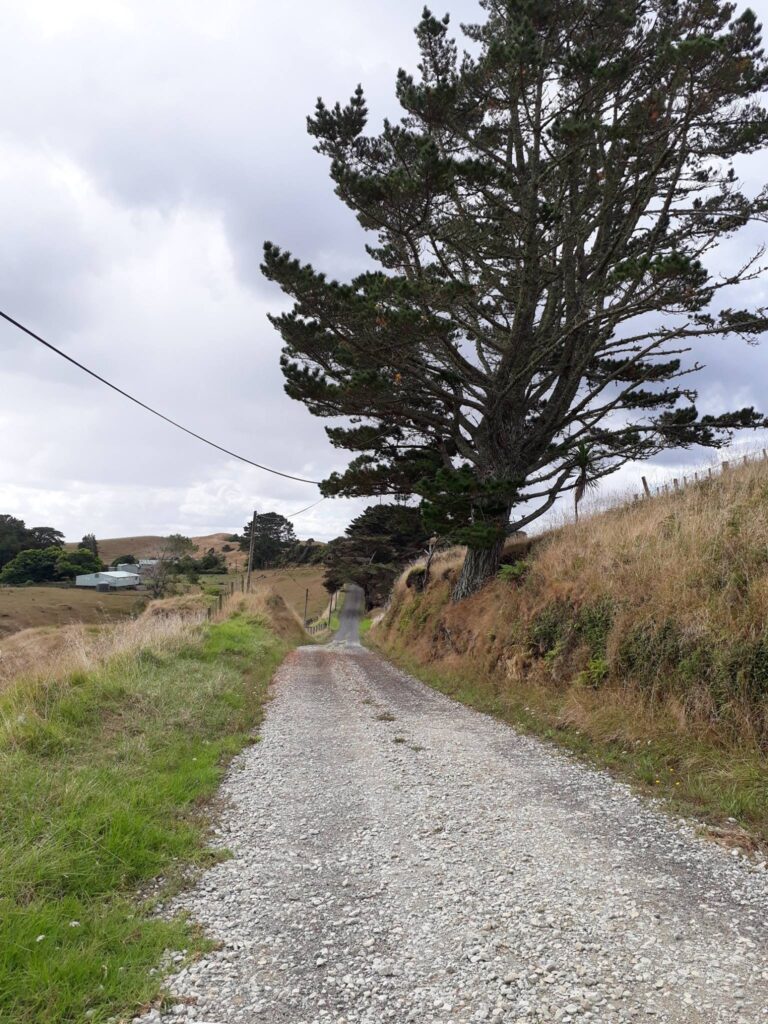
Rallysprint entries close this coming Thursday 16th @ 5pm.
Make hay while the sun shines
get your entry in…
Every great event is made up of our awesome volunteers, we need you!
Please hit the button above & reach out to help us out for the day.
The cheeky banter at the start line, tucked away on the corners or our flying finishes.
Lend us a hand 🙂
PERKS
- Free lunch
- Good viewing
- Next best thing if you’re not racing.
We look forward to seeing you at the event.
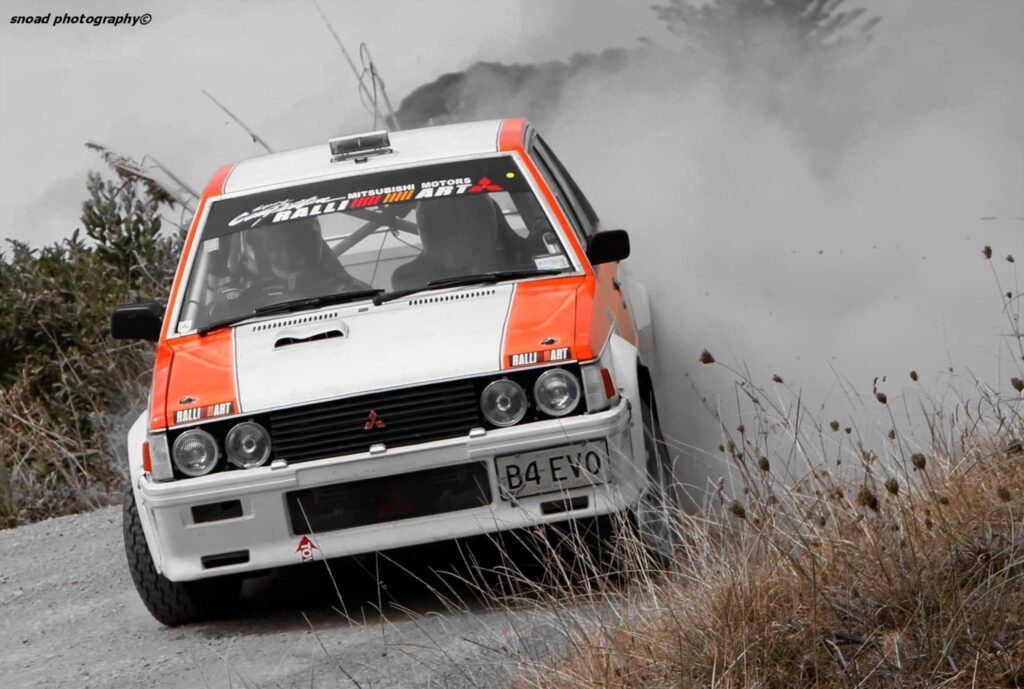
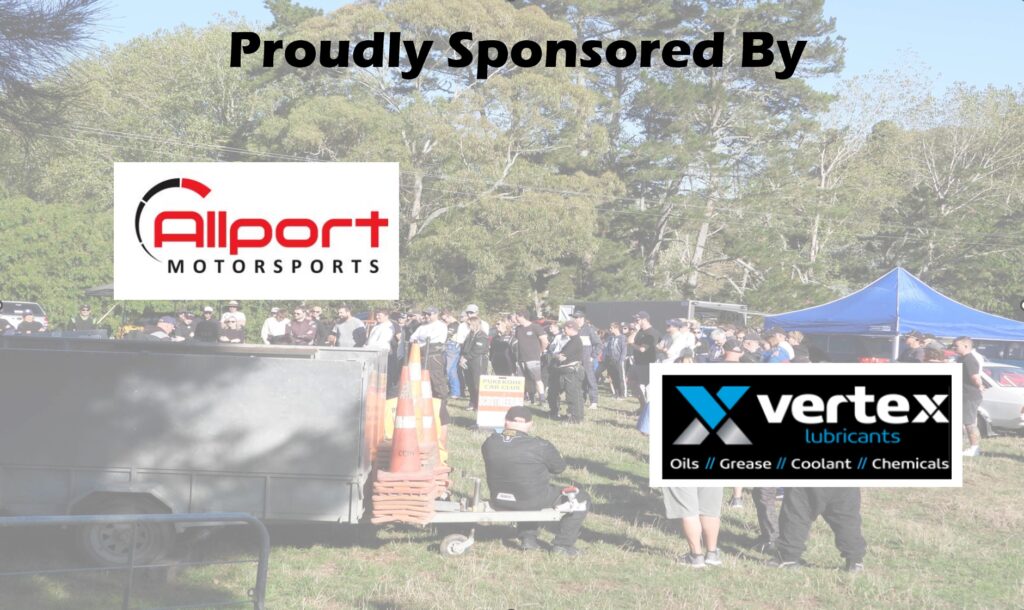
ROAD CLOSURES will be in effect in the region on Sunday 19th with TARGA BAMBINA also on.
Take note of the road closures when travelling in – CLICK the below links to REVIEW TIMES
VICE PRESIDENTS REPORT
Well, what a roller coaster so far this year. Google photos reminding me what we did three years ago had me take stock of what’s happened these past three years and just how much crap has been thrown at us all.
Prior to lockdown we went on our adventure to Rally Sweden but within 3 weeks of being home the whole country was plunged into lockdown (no it wasn’t us that brought it in I promise!) The club was so fortunate to get Bothwell Loop Rallysprint in the weekend before everything changed. Auckland’s short, sharp hit it hard lockdown seemed to drag on feeling more like the long and protracted lockdown.
And just when things started to feel like we were getting back to normal, with events being run under stricter covid rules, Auckland was locked down once again with many events affected, but this time it seemed to hurt more when we saw everyone else being able to get out and about and have fun.
This year it’s not lockdowns but the weather that is playing havoc with events. Our hearts go out to all affected, it’s absolutely gob smacking what has happened not only in the Hawkes Bay & Northland Regions but in and around the suburbs of Auckland with many affected by flooding.
This has already caused many cancellations of events and I’m sure more to come if we get anymore rain that is slightly more than a light shower with everything being so wet.
So here’s hoping we start to catch a break.
The committee is working hard with the Allport Motorsports – Bothwell Loop Rallysprint only a week away, we are so fortunate to have such supportive residents on this road. This year we’ve mixed it up a bit running it in reverse direction for the first time, so special attention will be required during reconnaissance to get the notes right. There have been a few slips so when we say “don’t cut” don’t take it as a recommendation take it as gospel!!
As always we need helpers, we know it’s Targa Bambina as well that weekend which is depleting some of our regular helpers. So, if you are at a loose end please think about giving back to the club and helping us out as we can’t run events without you.
And just something a little different a few members from the club joined in to help with Bombay Schools Transport day and we took some lucky winners for a ride to school. It was great seeing the smiles from ear to ear on all the kids climbing in and out of the cars. Thanks to all that came along and made it a great morning.
Lastly I’d really like to thank both Nikki and Graham who are both doing an absolute stella job getting information out to our members and beyond. I hope you have noticed the increased newsletters and social media presence, thanks guys keep up the great work!!
Cheers, Suzie
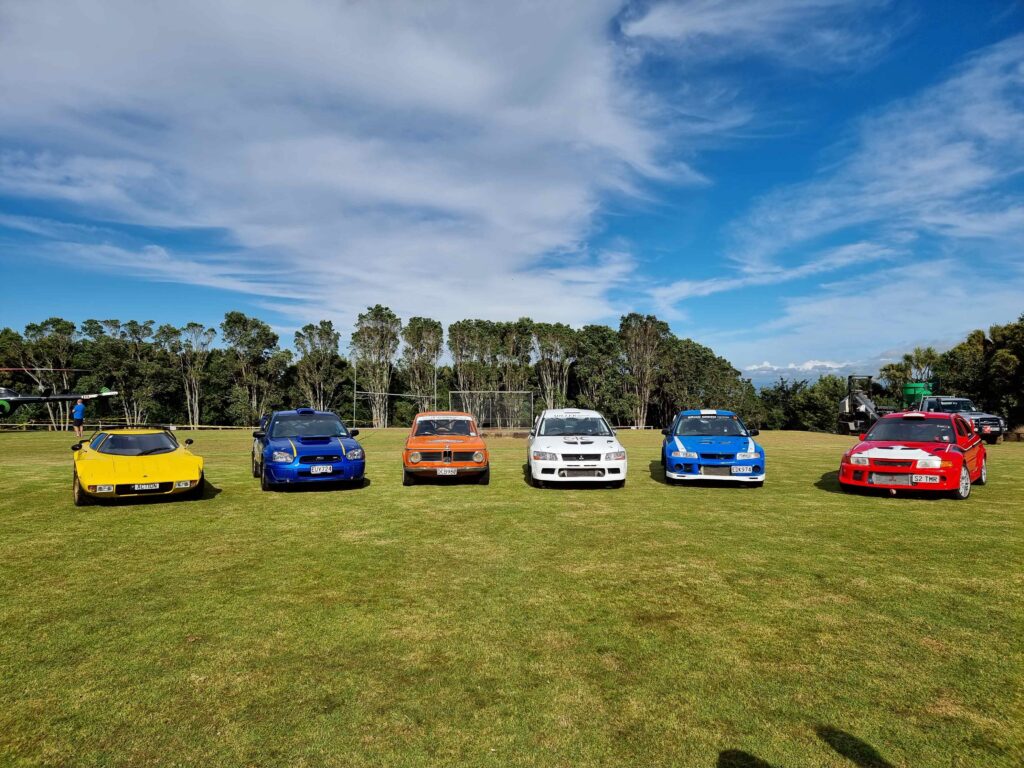
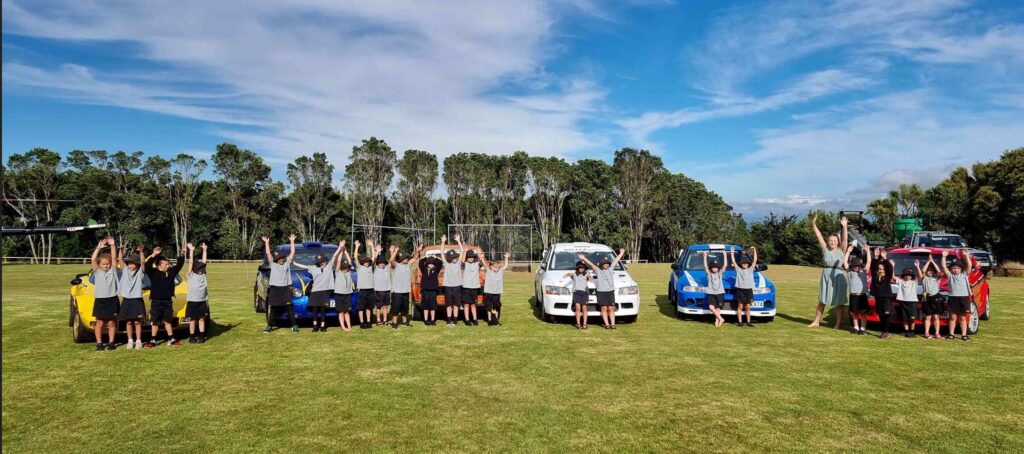
Bombay School Transport Day

Some of our PCC members took their cars out for a different type of event on Friday March 3rd – Transport Day.
Friday March 3rd was transport day for Bombay School & the kids were in for a treat with a variety of different forms of transport on show.
Some lucky kids even got a ride in on their forms of transport, how cool!
The morning was filled with excited petrolheads and adrenaline-fueled children who had access to the most jaw-dropping vehicles around. It was a dream come true for every racer with stunning cars and trucks on display for everyone to enjoy. From sleek race cars to powerful trucks, service vehicles, and more, they were blown away by the horsepower, bright colours, rubber, and leather detailing on show. Not to mention, the helicopter and police dog unit who added to the excitement.
Jesse declared, “This was the best day of school ever!” And that’s precisely why Bombay Schools sponsors and supporters got behind Transport Day – for the kids.
The State of It
Plan thy journey wherever you go.
Safety campaigner Geoff Upson keeps us entertained at the best of times with his commentaries on the state of our roads.
Make sure car trailers have adequate spare tyres. Rally tyres on car trailers are not suitably adequate for the job, as we found out towing the club trailer to Port Waikato. Scared the bejesus out of the Takanini residents, the tyre blew & it sounded like a gunshot.
If you do get a flattie, use it as a good opportunity to time yourself on an ‘efficient’ tyre change, just like in stage.
Jump on FaceBook & support this guy, he’s a bit of a laugh & full support his way as he goes about trying to fix one pothole at a time.
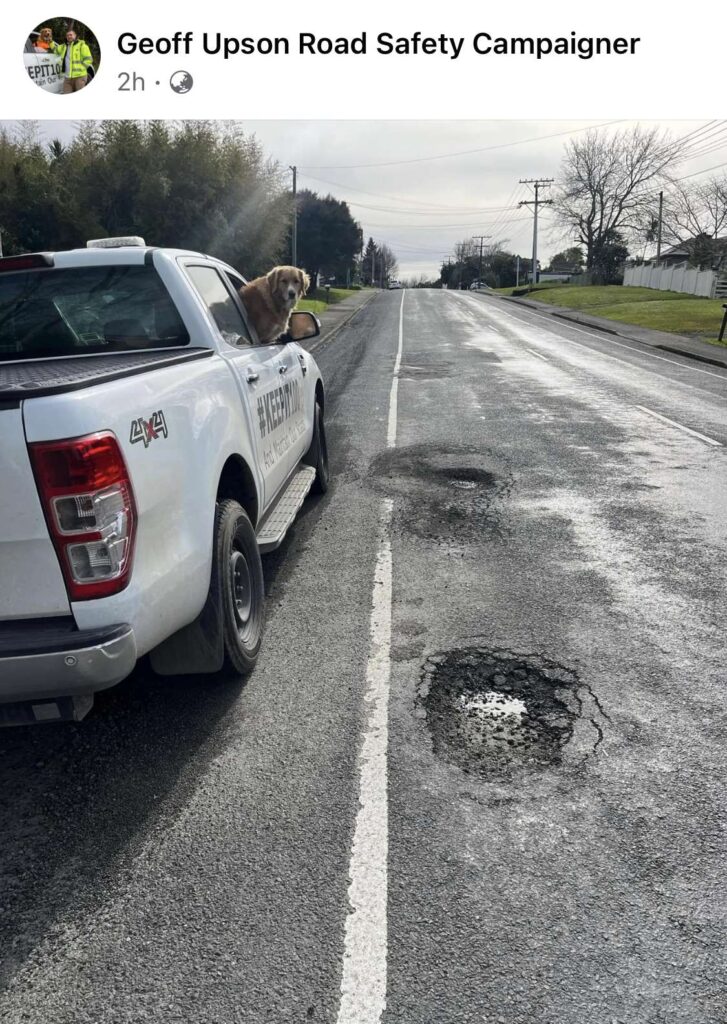
Where’s Paddon?

Kiwi driver Hayden Paddon is in Portugal preparing for Rally De Fafe, opening round of the European Rally Championship.
Embarking on a full ERC campaign with BRC Italy, this will be an 18th season with co-driver John Kennard.
Coverage will be live on WRC.
Testing has been in very wet, muddy conditions, the same conditions scheduled for the rally.
We wish Hayden all the very best for the opening round.
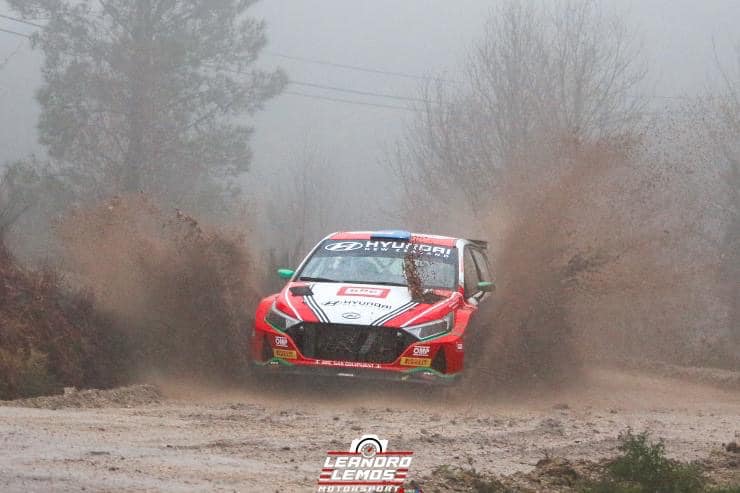
Knowledge Corner
Performance Oil: A Practical Guide

Not sure what oil you need in your vehicle? You aren’t alone. If you searched the internet for “high performance oil,” you would find more than 6 million results. You likely would see advertisements, price options, a few dozen brands to choose from and thousands of forum posts.
The problem is that there would be very little information on what makes oil “high performance,” when it should be used or even what the differences are in the various brands and options. The goal is to answer as many questions about high performance and normal oil as possible.
Performance Oil
All oils contain additives and seal enhancers that reduce leaks (both internal and external). It’s possible that after an oil change or two, the leaking could stop. This has the potential to reduce oil spots in your driveway and on burning oil in older engines.
How do they work? Oils contain seal conditioners and additives that cause o-rings, gaskets and seals to swell. In some cases, older
valve-guide seals in engines may have reduced seepage. This can result in lower oil consumption. Many high mileage motor oils
include detergents and claim they are designed to remove sludge from engines.
If you have a high mileage vehicle that has been well maintained and are attempting to mitigate more engine wear with realistic
expectations, a high mileage engine oil might be the right choice for you. Just don’t think that a high mileage oil will be a “silver bullet” for mechanical wear in your engine.
Differences in Engine Oil
Since most additive packages appear to be quite similar, it can be difficult to distinguish any real differences between many engine oils. Even with high mileage oils, the additives don’t seem to vary much at all.
The concentration of additives most likely is the primary distinction. Motor oil formulations are treated as trade secrets, so obtaining specific additive amounts and quantities can be nearly impossible. Safety data sheets typically only identify a range of additive percentages, and all the additives may not even be included if they are inert.
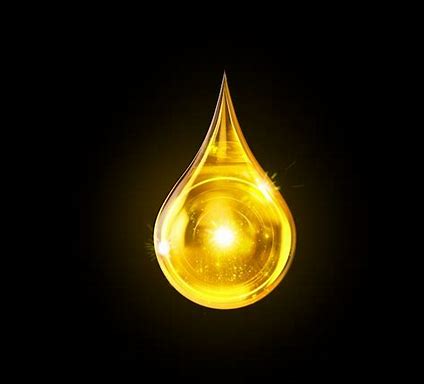
When it comes to the difference between performance and “normal” engine oils, marketing plays a big factor, as certain additives on the market come with all sorts of claims. Most of these additives are intended to minimize the asperities on metal surfaces by filling those microscopic valleys and creating smoother mechanical surfaces. Several studies have shown promise with this approach, but more research is still needed to determine the best way to stabilize these nanoparticles in oil suspensions.
How Often Should Oil in Engines Be Changed?
While this appears to be a straightforward question, more than one answer may apply. Depending on what you read or whom you listen to, you might receive conflicting advice. One side of the debate asserts that more frequent oil changes will be needed as an engine’s mileage increases, since the tolerances will not be as tight, allowing blowby and soot ingression. The other side contends that you should be able to extend your engine oil changes because any break-in wear will have already occurred and you won’t need to worry about voiding your warranty. To say that either side is right or wrong would be a fallacy.
An engine that has been well cared for, with all the scheduled maintenance performed, should be able to support longer intervals
between oil changes. As an engine is broken in, the sharp little edges and rough surfaces become polished down, enabling the
surfaces to mate better and lessening the chances of metal-to-metal contact (assuming full-fluid separation at the operating
temperature). A caveat to this would be when there is wear in the cylinders and on the rings, which may allow blowby. If you know what you are looking for, a comprehensive oil analysis test slate may not be necessary. A simple blotter spot test may be enough to determine if you have fuel dilution or coolant in your motor oil. To help you decide if your high mileage oil change intervals can be longer, consider the following advice:
- If your engine burns oil or you must add oil to it at regular intervals, you should not try to extend your oil change.
- If you have performed a compression test on your engine and found that you are losing pressure, you should avoid extended oil change intervals.
- If you are not using a quality filter, you should not extend your oil change. Reconsider the filter you are using, as it will have the greatest impact on engine life.
The better the oil is filtered, the longer the engine and oil will last.
Differences Between Oil Brands
With the exact formulations inaccessible, it can be helpful to examine the oil manufacturers’ safety data sheets for high mileage oils.
The information assembled below is based on data obtained from the SDS for 10W-30 oil from nine of the most popular engine oil
manufacturers.
| Manufacturer | VG | Base Oil |
|---|---|---|
| Pennzoil | 10W-30 | Blend of All 5 Groups |
| Castrol GTX | 10W-30 | Group II & III Blend |
| Valvoline MaxLife | 10W-30 | Group II & III Blend |
| Mobil1 | 10W-30 | Group III, IV & V Blend |
| Quaker State | 10W-30 | Group III, IV & V Blend |
| Havoline | 10W-30 | Group II & III Blend |
| Shell Helix (Rotella) | 10W-30 | Group III & IV Blend |
| Royal Purple HMX | 10W-30 | Group III & IV Blend |
| Amsoil (Signature Series) | 10W-30 | Group IV & V Blend |
Here’s more about the different base oil categories as established by the American Petroleum Institute (API).
Group I
Group I base stocks contain less than 90 percent saturates and/or greater than 0.03 percent sulfur. They have a viscosity index greater than or equal to 80 and less than 120 using the test methods specified in the table below.
Group II
Group II base stocks contain greater than or equal to 90 percent saturates and less than or equal to 0.03 percent sulfur. They have a
viscosity index greater than or equal to 80 and less than 120 using the test methods specified in the table below.
Group III
Group III base stocks contain greater than or equal to 90 percent saturates and less than or equal to 0.03 percent sulfur. They have a viscosity index greater than or equal to 120 using the test methods specified in the table below.
Group IV
Group IV base stocks are polyalphaolefins (PAOs). They can be interchanged without more qualification testing as long as the
interchange PAO meets the original PAO manufacturer’s specifications for physical and chemical properties.
The following key properties must be met in the substituted stock: kinematic viscosity at 100 degrees C, 40 degrees C and -40 degrees C ; viscosity index; NOACK volatility; pour point; and unsaturates.
Group V
Group V base stocks include all other base stocks not included in Group I, II, III or IV.
Conventional Motor Oil
Conventional motor oil begins as crude oil from the ground. It is either solvent refined or hydrotreated and can be classified as Group I or Group II, under the API base oil classifications.
This type of mineral base oil carries additives well due to its molecular structure. Yet, it does have a shorter lifespan when compared
with synthetic oil and will have a lower viscosity index than a true synthetic or Group III mineral oil.
Synthetic Motor Oil
Any motor oil with a base stock consisting of a Group III, IV or V oil would be considered a synthetic oil. Although Group III oils originate from a mineral oil, they undergo such high refining that they hold properties very similar to a true synthetic oil.
Synthetic oils generally are more resilient against temperature extremes and sheer than conventional motor oils due to their molecular structure and uniformity. One of the drawbacks of synthetic oils is that although they tend to have higher oxidative stability, they may not hold additives in suspension as well as a less refined oil.
Synthetic Blend
A synthetic blend is a combination of oils, such as a Group I or II oil mixed with a Group III, IV or V oil. Conventional and synthetic oils may be mixed so the mineral oil can hold additives in suspension while relying on the synthetic for scrubbing capability and oxidative stability.
A review of safety data sheets reveals that a Group II and Group III blend is the most prevalent, with few manufacturers using a Group IV or V oil as the synthetic in the blend.
Additive Packages
All base oils have properties that manufacturers would like to enhance, suppress or have added to their products. To do this, specific elements are added, such as zinc, ester ash, viscosity index improvers, antioxidants and other additives.
Lubricant manufacturers closely guard their proprietary formulations, which makes it difficult to determine exactly how much of certain elements are being used in them. By examining each product’s safety data sheet (SDS), you can get a clearer picture of what is being used and why.
With synthetics, it does not matter if your base oil is a Group III mineral oil or a chemically synthesized lubricant, because many additives in the formulation will help the base oil provide proper lubrication, not only in peak operating conditions but at starts and stops as well.
One Size Does Not Fit All
As is often the case with lubricants, there is no “one size fits all” approach. There likely are some formulation differences between high mileage oils and their traditional counterparts. Is this difference significant enough to warrant the increased price? Many would answer no.
Generally, for a vehicle’s engine to last long enough to reach an old age or high mileage, it must be well maintained. The best advice is to continue performing oil changes at the prescribed interval. Do your research on any motor oil you are considering, check which types of seals your engine has and use the best filter you can. After all, your filter will have as much, if not more, of an impact on your engine and oil as the oil itself.
Finally, remember that every oil formulation will have its own additive package, with each claiming to be better than the others, but they all have the ultimate goal of providing a lubricant to help ensure a long life for your engine.


 Pukekohe Car Club
Pukekohe Car Club



